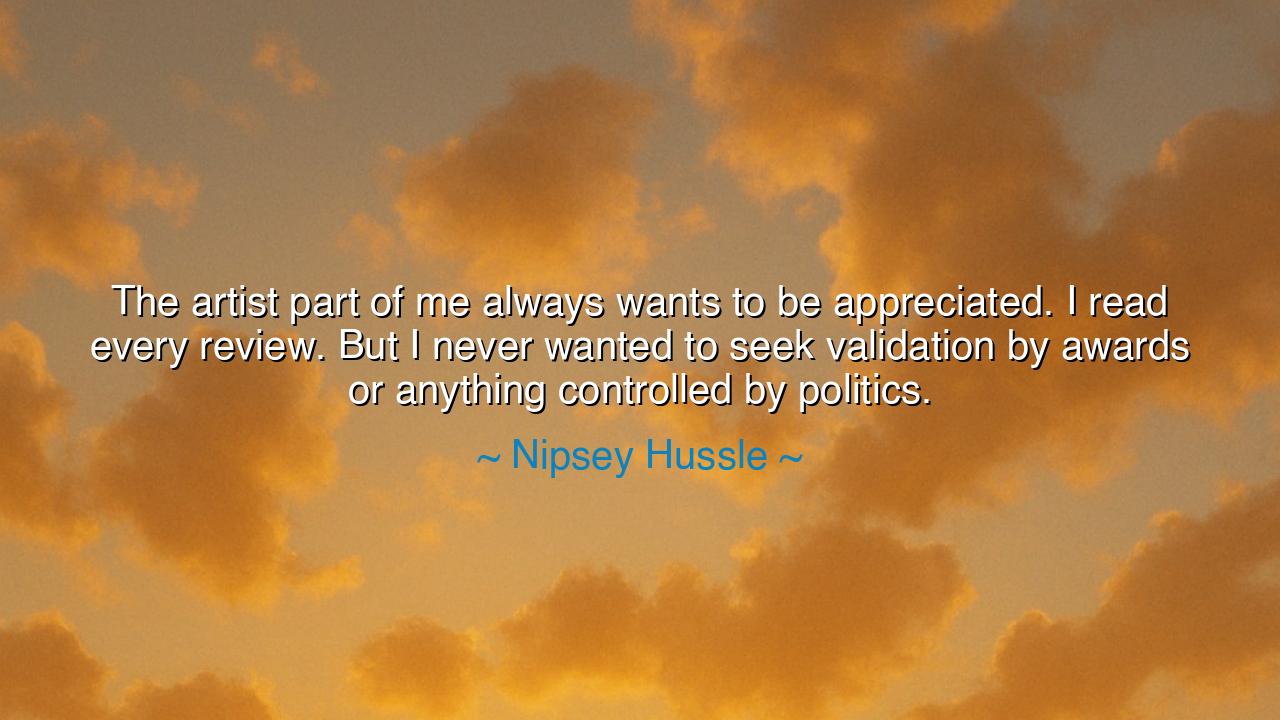
The artist part of me always wants to be appreciated. I read
The artist part of me always wants to be appreciated. I read every review. But I never wanted to seek validation by awards or anything controlled by politics.






The words of Nipsey Hussle — “The artist part of me always wants to be appreciated. I read every review. But I never wanted to seek validation by awards or anything controlled by politics” — shine with the honesty of a man who knew both the hunger of the heart and the snares of the world. In them he reveals the eternal tension between the soul’s desire to be seen and the spirit’s refusal to bow to corrupted systems. To be an artist is to create from the depths, and every creation yearns to be received — yet Hussle warns that true worth is not measured in trophies or institutions swayed by politics, but in the lasting impact of the art itself.
At its heart, this saying separates appreciation from validation. The former springs from the people — the listeners, the readers, the witnesses who are moved and changed by the work. The latter too often comes from the gatekeepers of culture, who bestow their honors not by purity of merit but by hidden rules, alliances, and influence. Hussle, rooted in the streets that raised him, declares that his spirit belongs to the people, not to the gilded halls where politics determines who is crowned and who is ignored.
History offers many echoes of this truth. Vincent van Gogh, whose paintings are now priceless treasures, received almost no appreciation in his lifetime and never won the validation of his peers. Yet his art outlived them all, proving that eternal value is not bestowed by institutions, but by time and truth. So too did Bob Marley, who was never honored with the greatest awards of the industry, yet became a prophet to the world through music that carried the cries of the oppressed. Both remind us that politics cannot measure the true power of art.
Hussle’s words also reveal his defiance of systems built to diminish. In a world where awards often serve the powerful and silence the authentic, he chose to walk another path: to build his empire, to own his music, to uplift his community. By rejecting the need for external crowns, he crowned himself with dignity. His reviews were read, his people’s love received, but his sense of worth was not bound to the judgments of those who trafficked in influence.
Let future generations hold this wisdom: seek appreciation, not validation; seek truth, not applause. For the power of the artist is not in statues or ceremonies, but in the lives transformed by their work. Nipsey Hussle’s words stand as a testament that greatness cannot be granted by politics — it is earned through authenticity, endurance, and love for the people who carry the art forward into eternity.






BPBao Phan
Nipsey Hussle’s quote makes me reflect on the idea of artistic integrity versus public approval. It seems like there’s a constant tension between staying true to your craft and trying to get recognized within an often-politicized industry. I love that he doesn’t want to play the awards game, but does this mean he’s willing to risk being overlooked for certain opportunities that come with that recognition? How does an artist navigate that line?
QTQuynhh Tramm
I admire Nipsey Hussle’s approach to appreciating his art without relying on awards. His focus on staying authentic is inspiring, but I wonder how many artists truly feel this way. Is it possible to fully ignore the pressure of industry politics, or does it eventually affect the way one’s work is received? Could his stance on validation be a reminder for other creators to focus on their passion, regardless of external acknowledgment?
IOixo oxi
Nipsey Hussle’s perspective on appreciating art without seeking external validation feels very grounded. I can’t help but think, though, that in today’s world, an artist’s success is often determined by public approval, whether through awards or media coverage. Can a true artist completely detach from this cycle? Or does the pressure to be recognized, in some form, inevitably influence the work they create? It seems like a tough balance.
KHKha Han
Nipsey Hussle’s words make me think about the conflict many artists face: wanting recognition for their craft but not wanting to rely on the political aspects of the industry. While I appreciate his integrity, I also wonder if it's realistic to completely separate art from the business side of things. Does striving for recognition or awards mean compromising one’s artistic vision, or can the two coexist without diminishing each other?
LMNgoc Huynh Le Minh
I admire Nipsey Hussle’s stance on seeking appreciation rather than validation through awards. It feels like he's focused on staying true to his art and his journey. But I’m curious, can you truly separate the desire for recognition from the reality of how the music industry works? Do artists risk being overlooked if they don’t play the game in terms of awards and recognition, or can their work still speak for itself in the end?